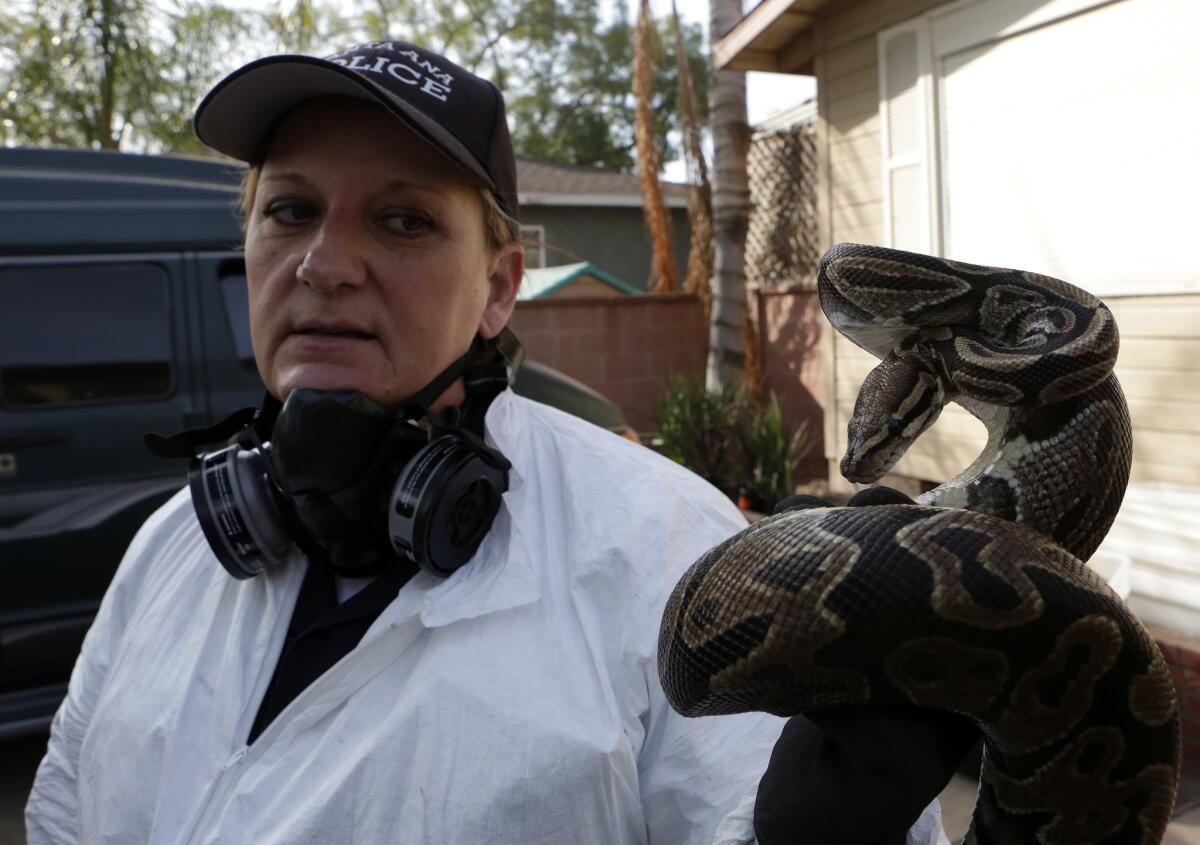Newport teacher held on animal cruelty charges

A Newport Beach grade school teacher who bred snakes as a hobby was arrested Wednesday on animal cruelty charges after authorities discovered more than 400 ball pythons — some alive, many dead — scattered throughout his cluttered home.
Animal control officers said it took much of the day to search the five-bedroom home in a Santa Ana neighborhood where residents for months had complained about a foul smell drifting from the home.
Investigators said they discovered 404 non-venomous snakes — 180 alive, 224 dead — inside rows of clear plastic containers with labels reading “pastel reaper,” “cinny ghost” and “orange belly.” In addition to the snakes, authorities said 45 rats and mice roamed freely inside the home. Others kept in tubs had started to eat one another other.
“I got rats everywhere,” one officer said in a police video that captured investigators first entering the home wearing gas masks and clutching Tasers.
William Buchman, a longtime teacher at Mariners Elementary School in Newport Beach, is identified on various reptile collector websites as a ball python breeder and was using a process known as “morphing” to achieve different patterns on the snakes, some that could sell for thousands of dollars.
But at some point, Buchman appears to have gone from a snake hobbyist to a hoarder, said Sondra Berg, Santa Ana Police Department-Animal Services supervisor.
“It’s pretty sad,” Berg said. “Hoarding is pretty much a mental condition. [Hoarders] need help.”
Chantelle Wolfe, 44, of Costa Mesa, said her son was in Buchman’s kindergarten class when he first started teaching at Mariner’s nine years ago. He was one of the first male teachers at the school, she said.
“Everyone enjoyed him,” Wolfe said, adding that Buchman was a good teacher who invested his time and resources in his students.
“I certainly hope that it doesn’t affect his teaching career, because he was a good teacher,” Wolfe said.
Authorities said Buchman’s mother died in 2011, and that her death appeared to have affected him profoundly. Wolfe said the pair were close.
Many of the dead snakes were still in plastic containers and there was no evidence of food or water in any of the cages, Berg said. Four of the bedrooms were filled with racks of containers, each holding 30 to 40 snakes. A refrigerator in the home was filled with dead rats.
Residents in the tidy neighborhood on Fernwood Drive said Buchman was pleasant but that the smell from the house had become overwhelming.
“We thought someone was dead,” said Forest Long Sr., 62, who lives next door. “We couldn’t open up the bedroom windows. My wife started to gag and throw up.”
Last year, Buchman, a Baltimore Ravens fan who lived alone, came over to watch the Super Bowl with neighbors, said Forest Long III, 18. But the snake breeder seemed to become reclusive after that.
The 18-year-old said a white van would sometimes pull up and deliver cages packed with mice.
Santa Ana Animal Control visited the home about a year ago, but didn’t see any of the conditions they saw Wednesday. Reports from neighbors and passersby of a “dead body smell” prompted further investigation.
Buchman, they said, started to park at a nearby park and walk home in order to avoid investigators.
Jason Haywood, president of Southern California Herpetology Assn. and Rescue, who was helping transport the snakes to a veterinarian in Yorba Linda, said once the surviving snakes are treated they’ll be placed into homes, classrooms and zoos. In addition to being easy to care for, some of them are very valuable because of their patterns.
Haywood said a white and yellow phantom butter ball python he spotted in the home could net $5,000. He estimated there were $100,000 worth of snakes in the home.
Sam S. Makki, director of Reptile Rescue Orange County, said he was also called on to help with the handling of the pythons, but that the scene inside the home was depressing.
“Animals are awesome and it can be a rewarding experience” Makki said. “But don’t bite off more than you can chew.”
— Nuran Alteir contributed to this report.
Flores and Vives write for the Los Angeles Times. They can be reached at [email protected] and [email protected].